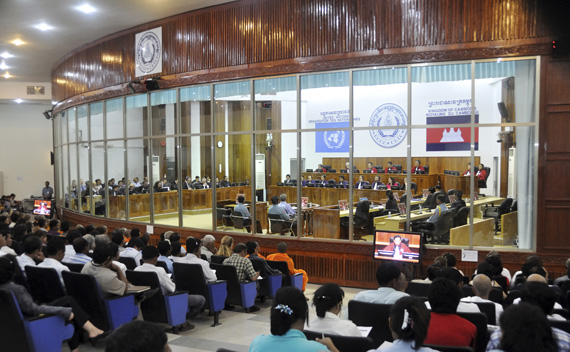Do We Need a Khmer Rouge Tribunal?
More on:

The first conviction of Cambodia’s Khmer Rouge tribunal, of Tuol Sleng prison commandant Kaing Guek Eav, also known as Duch, only sparked more criticism, and seemed to resolve little for survivors of the genocide. Duch’s relatively light sentence – he was given 19 years in jail, after taking into account time already served – infuriated many survivors. Many average Cambodians did not seem to understand how the tribunal, a mix of foreign and Cambodian judges, had come to this decision about a man who’d overseen a “prison” that was in reality a death camp from which only a handful of people survived.
That incomprehension highlights one of the many failings of the tribunal. In contrast to tribunals held regarding the Balkan wars, the Cambodian tribunal has proven woefully inadequate in educating average Cambodians about its workings, perhaps because Prime Minister Hun Sen has little interest in showing the workings of a fair tribunal to a people accustomed to his compliant courts. The tribunal’s budget for public education most years has been miniscule, and the court facilities themselves, located far from central Phnom Penh, are intimidating to average Cambodians. Worse, the Cambodian members of the tribunal, again possibly with the prodding of the government, have resisted expanding the number of potential defendants, which might have allowed for a slightly broader examination of the Khmer Rouge’s crimes. Again, such broader investigations would have been uncomfortable for Hun Sen, since many of his top associates are former KR cadres themselves.
The cost of the Khmer Rouge tribunal, meanwhile, continues to escalate, even as its process drags on slowly: Early estimates of the cost proved too low, and it now could wind up costing upwards of $200 million. United Nations investigations have found massive inflation in the salaries of local workers at the tribunal. The tribunal also has not been accompanied by any sort of Rwanda-like attempt at village level reconciliation or judgments, which potentially would have made it easier for average Cambodians to live alongside their former tormentors.
All this is not to say that Cambodians don’t deserve accountability for a genocide that was, on a per capita basis, perhaps the worst in history. But at a time when aid dollars are increasingly scarce, and Western donors increasingly stingy, is the vast outlay of funds on a tribunal the wisest use of dollars, given that this assistance might make donors think twice about other types of aid to Cambodia? Is it worth it to fund a tribunal with a weak public outreach, a too-limited mandate, and little ability to create a real climate of accountability in a country that desperately needs it? Seeing Duch sentenced, some survivors might say that any cost is worth it. But by the time the tribunal gets around to trying the other former Khmer Rouge leaders, like “Brother Number Two” Nuon Chea, these elderly men and women might be dead anyway.
More on:
 Online Store
Online Store